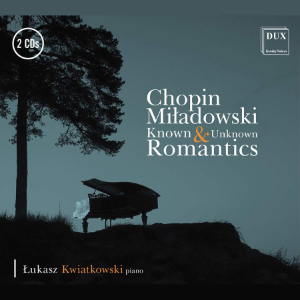
Known and Unknown Romantics
Florian Stanisław Miładowski (1819-1889)
Quatre Mazurkas (pre 1853)
Impromptu in E major (pub.1857)
Noutka Romance sans paroles in B minor (pub.1860)
Polonaise in B flat major Op.15 (pub.1854)
Fryderyk Chopin (1810-1849)
Two Nocturnes Op.27 (1833-36)
Mazurka Op.63 No.3 (1846)
Mazurka Op.68 No.2 (1827)
Scherzi 1-4
Variations on La ci darem la mano from Mozart’s Don Giovanni Op.2 (1827-28)
Łukasz Kwiatkowski (piano)
rec. 2020-21, Grazyna and Kiejstut Bacewicz Academy of Music, Łódź, Poland
Dux 1742/43 [2 CDs: 96]
The names Fryderyk Chopin and Florian Stanisław certainly test the limits of the phrase Known and Unknown Romantics. In my nearly fifty years of chasing down recordings of unknown romantic piano composers I have never even heard Miładowski’s name and it is worth finding out who he was. The biography here is from the booklet as biographical information appears to be scant. He was born in Minsk and after taking lessons with his father he continued with one F. Thiebe in Vilnius about whom I have found no information. Miładowski was giving concerts by the age of ten and in 1836 took up a post as conductor and piano teacher for Count Raudondvaris in the Kaunus region. During the next decade he spent time in Berlin and Vienna, continuing his studies before returning to Vilnius where he befriended Polish composer Stanisław Moniuszko (1819-1872); together they founded the St Cecilia Music Society in 1854. His final move was to France in 1862 and it was there that he died in 1889. Compositional information is also scant; beyond a handful of piano works there are songs and chamber works and, not surprisingly considering his efforts in promoting church music with Moniuszko, several religious choral works.
Disc one opens and closes with mazurkas, two by Chopin to end and four quite Chopinesque mazurkas by Miładowski to start the recital. The first is a brisk dance in B major and it is followed by a sensual mazurka in C minor whose outer sections reminded me somewhat of the twelfth variation from Rachmaninov’s Paganini rhapsodie. The next two dances, in A flat major and A minor respectively, are more Chopin like, melodic and engaging though both have moments of more extrovert virtuosity than Chopin would have considered for his little tone poems. The Impromptu is a fast waltz, jaunty and full of light figuration surrounding a more lyrical central section that retains elements of the waltz. Noutke is, as its subtitle suggests, a song without words, a simple melody over a gently syncopated left hand accompaniment; on the third run through the melody moves into octaves and there is some added decoration it all makes for an engaging character piece. The final unknown work is a polonaise that owes a little more to Liszt than Chopin and once again Miładowski has an eye on the concert stage in its more flamboyant passages.
It is worth hearing this CD for the utter rarity of the attractive Miładowski, and the Chopin items are pleasant additions to round the disc off, especially the two mazurkas. The second disc is all Chopin, the four scherzi and the Variations on La ci darem and though Kwiatkowski plays these pieces quite well and his lyrical playing is excellent his would not be my first choice. I was a little dismayed by some lack of rhythmic control and smudged playing; take a listen to the first page of the B minor Scherzo in which there is choppiness in the lines (bars 17 to 20 for example) or the last bar of the descent (bar 32) which is a scrabble in all of its several appearances. Small points perhaps but with so many marvellous versions available, Hough on Hyperion (CDA67456) or Simon Trpceski on EMI Classics (5181712) for example, small points matter. The opening of Chopin’s fourth Scherzo dances under Trpceski’s fingers making Kwiatkowski seem a little earthbound. In the Mozart Variations Kwiatkowski again has the fingers for the devilish amount of notes the young Chopin taxes a pianist with and has the lyrical touch to boot but just listening to one recent alternative, Bruce Liu, winner of the 2021 International Chopin Competition (Deutsche Grammophon 4861555 review) there is a lightness and a clarity to the dazzling writing that Kwiatkowski doesn’t match.
The presentation is attractive as is usual from Dux with booklet notes in Polish and English. Though I have my reservations about the Chopin items I would recommend this disc for those exploring the world around Chopin’s time and the composers who have faded into his shadow. Be aware, the Miładowski items make up about 23 minutes of the recital.
Rob Challinor
Help us financially by purchasing from





















